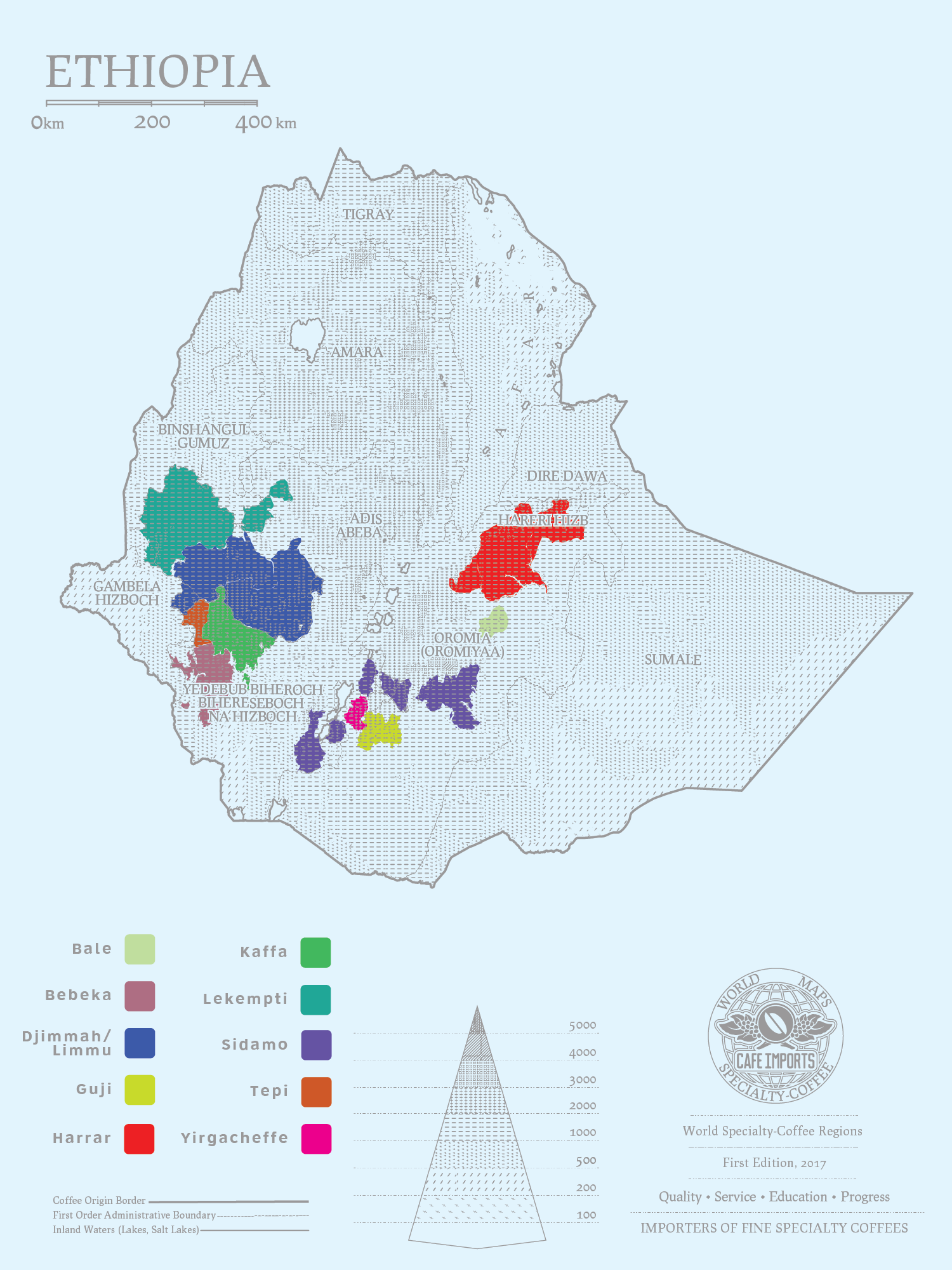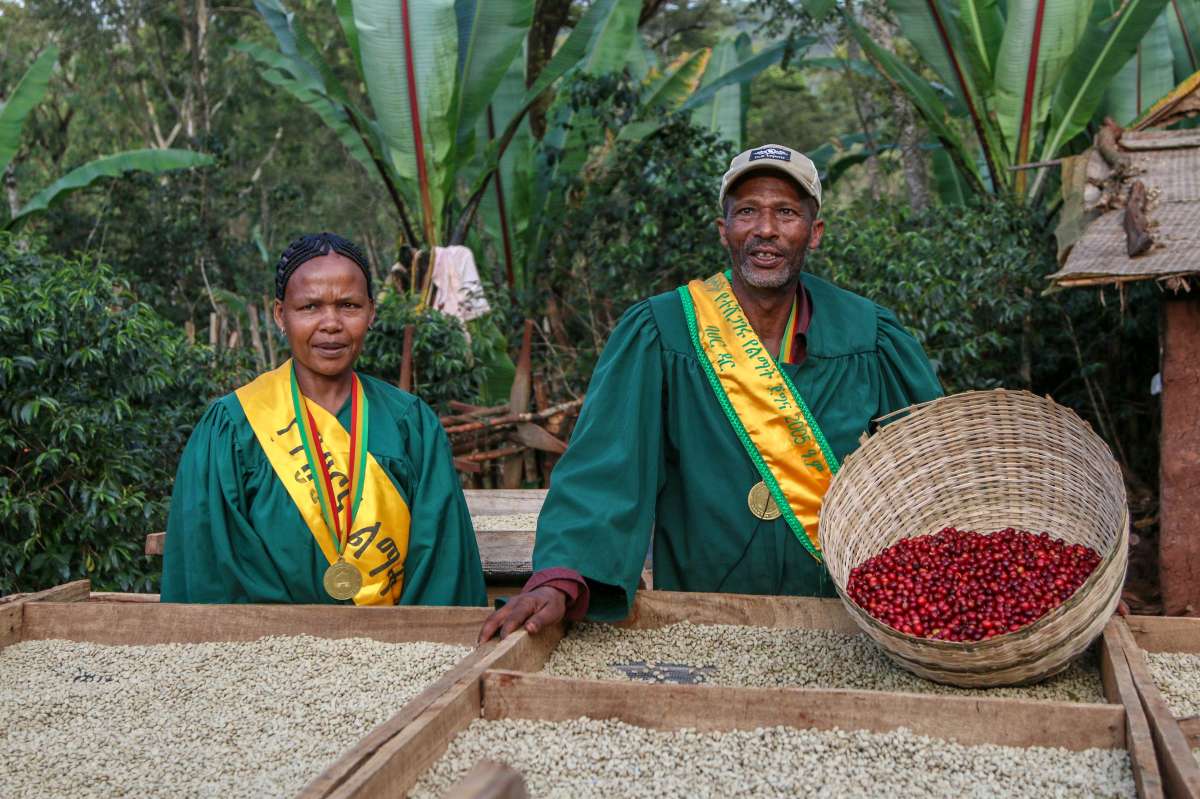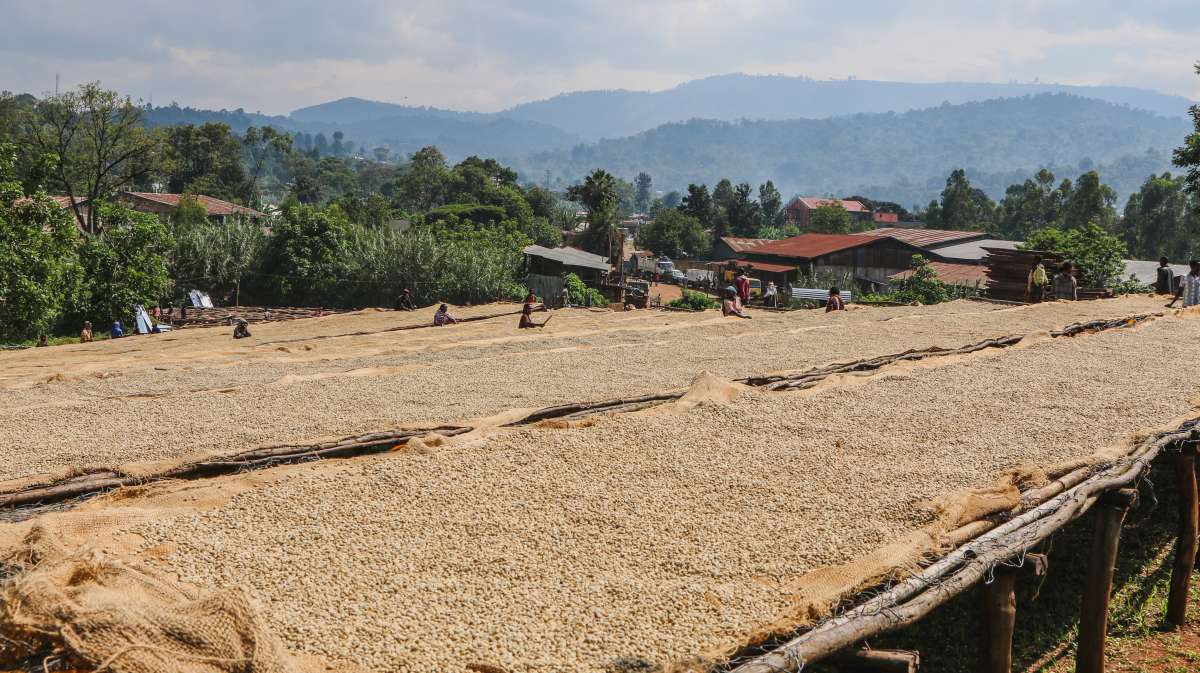0
CHECK THE PRODUCTS
Region: Tega village, Bonga, Kibo, Kaffa
Farm: Tega&Tula
Variety: 74165, 74110
Process: Natural
Altitude: 1830-1870 masl
Harvest: 2020 September-January
Supplier: Cafe Imports
Espresso/Brew
250 gr Whole bean :
1kg whole bean :



Notes Of A Roaster From The Underground: fruit bomb, tart, velvety, syrupy
 Omni-roast (Espresso/Brew)
Omni-roast (Espresso/Brew)
OMNIROAST or "absolute peak". We do not have different roasting profiles for espresso and drip brewing methods. We believe in their harmony. We underline the fact that you do not have to drink burnt coffee if you are drinking espresso or "sour" coffee if you are drinking drip coffee. Highlighting a cliche: "One day everybody will roast omni".
In 2007, Cafe Imports head of sourcing and CEO, Jason Long, cupped a coffee from a western region of Ethiopia not very well-known then for high-quality coffee, and it inspired him to venture outside of sourcing in Yirgacheffe, Sidama, and Harrar for the first time. The coffee turned out to be from a single farm, Tega & Tula Specialty Coffee Farm, established in the year 2000 by Ahadu Woubhset. Tega & Tula are actually two adjacent farms, named after the two nearby villages of Tega and Tula, found in the woreda, or district, of Gibo, in Kaffa, Ethiopia. The total farm area is 500 hectares in size, with nearly 400 hectares planted in coffee. The farm is certified organic and produces both Washed and Natural coffees, and it not only has a wonderful flavor profile but also full traceability down to the producer—and nowadays down to the "block," or subplot. Ahadu is an entrepreneur who was a founding member of the executive team at the Ethiopian Commodity Exchange, who left the ECX and decided to invest in a farm himself in order to produce entirely specialty coffee. He found the perfect spot in the famous Kaffa Zone, which is considered the absolute birthplace of Arabica coffee, and decided to start up an operation that aimed to preserve the natural beauty of the area, support the local community, and of course produce fantastic coffees. Today, Tega & Tula Coffee Farm is an anchor relationship for Cafe Imports, and every year the lots and the traceability get better.
This particular block is called Kewo, and is a 49.82-hectare subplot located in the Tega farm. This is the block where the coffee nursery is located, as well as the washing station. It's also surrounded by UNESCO heritage forests. It was planted and/or renovated in 2000, 2001, and 2004, and has 74165 and 74110 coffee varieties. The coffee called 74110 was developed by the Jimma Agricultural Research Center in the 1970s, bred for their profile as well as for their resistance to disease, pests, and drought. The variety 74165 is a commonly distributed cultivar whose mother plant came from a CBS-resistant selection discovered in Metu-Bishari.

Among coffee-producing countries, Ethiopia holds near-legendary status not only because it’s the “birthplace” of Arabica coffee, but also because it is simply unlike every other place in the coffee world. Unlike the vast majority of coffee-growing countries, the plant was not introduced as a cash crop through colonization. Instead, growing, processing, and drinking coffee is part of the everyday way of life, and has been for centuries, since the trees were discovered growing wild in forests and eventually cultivated for household use and commercial sale.
From an outsider’s perspective, this adds to the great complexity that makes Ethiopian coffee so hard to fully comprehend—culturally, politically, and economically as well as simply culinarily. Add to that the fact that the genetic diversity of the coffee here is unmatched globally—there is 99% more genetic material in Ethiopia’s coffee alone than in the entire rest of the world—and the result is a coffee lover’s dream: There are no coffees that are spoken of with the reverence or romance that Ethiopian coffees are.
One of the other unique aspects of Ethiopia’s coffee production is that domestic consumption is very high, because the beverage has such a significant role in the daily lives of Ethiopians: About half of the country’s 6.5-million-bag annual production is consumed at home, with roughly 3.5 million bags exported.
Coffee is still commonly enjoyed as part of a “ceremonial” preparation, a way of gathering family, friends, and associates around a table for conversation and community. The senior-most woman of the household will roast the coffee in a pan and grind it fresh before mixing it with hot water in a brewing pot called a jebena. She serves the strong liquid in small cups, then adds fresh boiling water to brew the coffee two more times. The process takes about an hour from start to finish, and is considered a regular show of hospitality and society.
The majority of Ethiopia’s farmers are smallholders and sustenance farmers, with less than 1 hectare of land apiece; in many cases it is almost more accurate to describe the harvests as “garden coffee,” as the trees do sometimes grow in more of a garden or forest environment than what we imagine fields of farmland to look like. There are some large privately owned estates, as well as co-operative society comprising a mix of small and more mid-size farms, but the average producer here grows relatively very little for commercial sale.

There are several ways coffee is prepared for market in Ethiopia. Large estates are privately owned and operated by hired labor; the coffee is often picked, processed, and milled on the property. On the other end of the spectrum, “garden coffee” is brought by a farmer in cherry form to the closest or most convenient washing station, where it is sold and blended with other farmers’ lots and processed according to the desires of the washing station. Co-op members will bring their cherry to be weighed and received at a co-op washing station, where there is more traceability to the producer level as per membership rosters of the co-operative.
The profile of Ethiopian coffees will vary based on a number of factors, including variety, process, and microregion. As a general rule of thumb, natural processed coffees will have much more pronounced fruit and deep chocolate tones, often with a bit of a winey characteristic and a syrupy body. Washed coffees will be lighter and have more pronounced acidity, though the individual characteristics will vary.
Harrar coffees are almost always processed naturally, or “dry,” and have a distinctly chocolate, nutty profile that reflects the somewhat more arid climate the coffee grows in.
Sidama is a large coffee-growing region in the south, and includes Guji and the famous Yirgacheffe.
Here is a very basic breakdown of what we look for in coffees from some of the microregions of Yirgacheffe, in the Sidama region.
ADADO: Delicate stone fruit with citrus and floral layers that create a nice balanced structure.
ARICHA: Complex and almost tropical, with a juicy fruit base and a sugary, floral sweetness.
BERITI: Prominent florals backed by a creamy citrus.
CHELCHELE: Cooked-sugar sweetness more like toffee or caramel, almond, and a floral, citrus overtone.
KOCHERE: Fruit tea backed by citrus and stone fruit.
KONGA: Peach and apricot—more floral stone fruit—along with a strong, tart citrus.
** About Ethiopian place names: There is much confusion and inconsistency where place names are concerned in Ethiopia, partially due to the fact that Amharic does not use a Roman alphabet like English does. Therefore, it is not necessarily incorrect to spell the region as Yirgacheffe, Yirgachefe, or even Yirga Chefe. We have chosen a company-wide set of standard spellings for clarity’s sake, but there are various ways of interpreting the phonetic spelling of certain places.
As for Sidamo vs. Sidama, it has been brought to our attention that “Sidamo” is a somewhat disparaging variant on the place name, and we have decided to use the more acceptable Sidama instead.

The Ethiopian Commodity Exchange
The Ethiopian Commodity Exchange (ECX) was established by the Ethiopian government in 2008 with the intention of democratizing marketplace access to farmers growing beans, corn, coffee, and wheat, among other commodities. As farmers in Ethiopia typically own very small plots of land and are largely sustenance farmers—growing what crops they need for household use and selling the surplus for cash—it was decided that standardization would be the most egalitarian way to improve economic health and stability in the agricultural sector.
The ECX strove to eliminate the barriers to sale by giving farmers an open, public, and reliable market to which to sell their products for a set and relatively stable price. At its inception, the ECX rules dictated that any coffee not produced by a private estate or a co-operative society was required to be sold through the Exchange, which established guaranteed price and sale for farmers, but by design, it took the “specialty” out of the coffee and turned it into a commodity—escaping all traceability aside from the most basic regional and grade information.
Part of the definition of a “commodity” is that it must be replaceable: For instance, 100 bags of Grade 1 washed Yirgacheffe bought in December must be of equivalent quality to 100 bags of Grade 1 washed Yirgacheffe bought in August, period. Coffees are assigned grades based on their uniformity, cleanliness, and presence or absence of defect without consideration for flavor notes.
After pushback from the specialty-coffee industry and several rounds of intense negotiation, a later iteration established that washing-station information was made available after the coffees were purchased, though certainly tracing them down to the individual producers would prove impossible.
In March 2017, the ECX voted to allow direct sales of coffee from individual washing stations, which will not only allow for increased traceability, but will also allow for repeat purchases and relationship building all along the chain—a change that increases the potential for higher prices to the farmers. It remains to be seen what the impact of greater traceability and more direct sales will have on specialty coffees from Ethiopia, but the industry appears optimistic.
